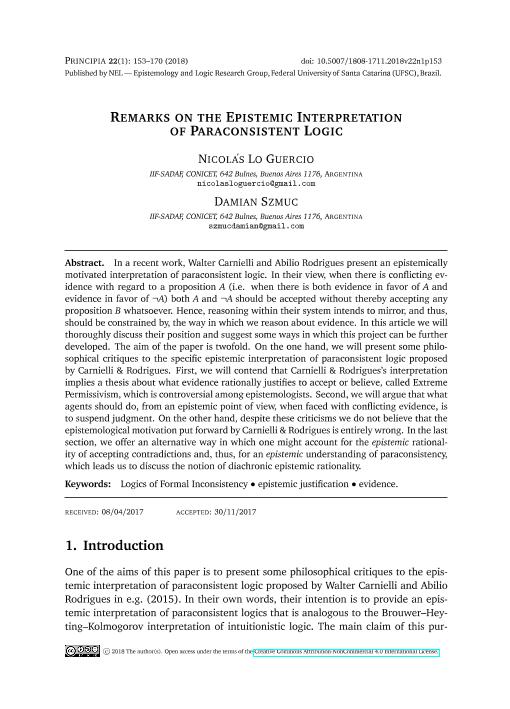Mostrar el registro sencillo del ítem
dc.contributor.author
Lo Guercio, Nicolás Francisco

dc.contributor.author
Szmuc, Damián Enrique

dc.date.available
2020-02-10T15:07:32Z
dc.date.issued
2018-04
dc.identifier.citation
Lo Guercio, Nicolás Francisco; Szmuc, Damián Enrique; Remarks on the epistemic interpretation of paraconsistent logic; Universidade Federal de Santa Catarina. Departamento de Filosofía; Principia; 22; 1; 4-2018; 153-170
dc.identifier.issn
1414-4247
dc.identifier.uri
http://hdl.handle.net/11336/97039
dc.description.abstract
In a recent work, Walter Carnielli and Abilio Rodrigues present an epistemically motivated interpretation of paraconsistent logic. In their view, when there is conflicting evidence with regard to a proposition A (i.e. when there is both evidence in favor of A and evidence in favor of ¬A) both A and ¬A should be accepted without thereby accepting any proposition B whatsoever. Hence, reasoning within their system intends to mirror, and thus, should be constrained by, the way in which we reason about evidence. In this article we will thoroughly discuss their position and suggest some ways in which this project can be further developed. The aim of the paper is twofold. On the one hand, we will present some philosophical critiques to the specific epistemic interpretation of paraconsistent logic proposed by Carnielli & Rodrigues. First, we will contend that Carnielli & Rodrigues's interpretation implies a thesis about what evidence rationally justifies to accept or believe, called Extreme Permissivism, which is controversial among epistemologists. Second, we will argue that what agents should do, from an epistemic point of view, when faced with conflicting evidence, is to suspend judgment. On the other hand, despite these criticisms we do not believe that the epistemological motivation put forward by Carnielli & Rodrigues is entirely wrong. In the last section, we offer an alternative way in which one might account for the epistemic rationality of accepting contradictions and, thus, for an epistemic understanding of paraconsistency, which leads us to discuss the notion of diachronic epistemic rationality.
dc.format
application/pdf
dc.language.iso
eng
dc.publisher
Universidade Federal de Santa Catarina. Departamento de Filosofía
dc.rights
info:eu-repo/semantics/openAccess
dc.rights.uri
https://creativecommons.org/licenses/by-nc-sa/2.5/ar/
dc.subject
PARACONSISTENT LOGIC
dc.subject
BASIC LOGIC OF EVIDENCE
dc.subject
EPISTEMOLOGY
dc.subject
PERMISSIVISM
dc.subject.classification
Filosofía, Historia y Filosofía de la Ciencia y la Tecnología

dc.subject.classification
Filosofía, Ética y Religión

dc.subject.classification
HUMANIDADES

dc.title
Remarks on the epistemic interpretation of paraconsistent logic
dc.type
info:eu-repo/semantics/article
dc.type
info:ar-repo/semantics/artículo
dc.type
info:eu-repo/semantics/publishedVersion
dc.date.updated
2020-01-31T18:59:46Z
dc.identifier.eissn
1808-1711
dc.journal.volume
22
dc.journal.number
1
dc.journal.pagination
153-170
dc.journal.pais
Brasil

dc.journal.ciudad
Florianópolis
dc.description.fil
Fil: Lo Guercio, Nicolás Francisco. Instituto de Investigaciones Filosóficas - Sadaf; Argentina. Consejo Nacional de Investigaciones Científicas y Técnicas; Argentina
dc.description.fil
Fil: Szmuc, Damián Enrique. Instituto de Investigaciones Filosóficas - Sadaf; Argentina. Consejo Nacional de Investigaciones Científicas y Técnicas; Argentina
dc.journal.title
Principia

dc.relation.alternativeid
info:eu-repo/semantics/altIdentifier/doi/http://dx.doi.org/10.5007/1808-1711.2018v22n1p153
dc.relation.alternativeid
info:eu-repo/semantics/altIdentifier/url/https://periodicos.ufsc.br/index.php/principia/article/view/1808-1711.2018v22n1p153
Archivos asociados
